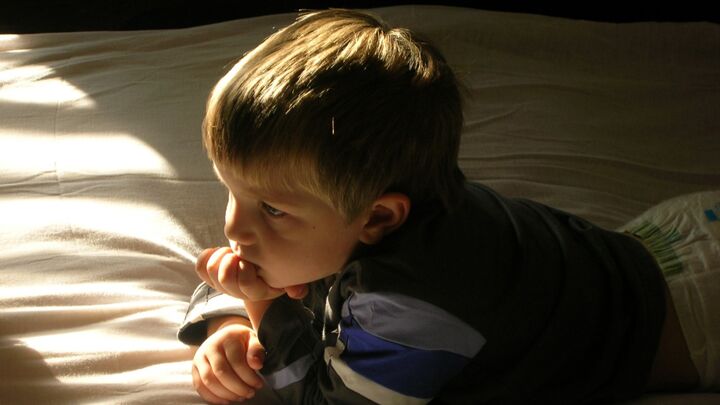
TV’s War on Fathers
Fathers are useless, ignorant layabouts, less mature than the children they are supposed to be raising. That’s the message you get from nearly every tv show and ad. Almost all parents—93 percent—acknowledge that children’s tv shows don’t represent real-life fathers, according to a report by UK parenting website Netmums published on June 11. But most don’t care.
The figures show that only 18 percent think these shows could make children believe their dads are useless. Presumably that means 82 percent don’t have a problem with them.
But the fact is, children’s tv gives children a horrible message about fatherhood. And it’s getting worse.
For years, shows aimed at teens, like The Simpsons, have encouraged children to look down on their fathers. But now it’s spreading to a younger audience.
The trend in young children’s tv is striking. Go back a couple of generations, and shows for young children often supported family. They featured reasonable families—not perfect of course—but with the father in control, looking after his wife and children. When I was growing up, children’s tv didn’t really show families at all—we had programs like Thomas the Tank Engine and Postman Pat.
Now the shows attack the father. The Netmums report introduced me to Peppa Pig, currently one of the most popular children’s tv shows in the Western world. I’d never seen it before, so I went to YouTube, and clicked on one of the top hits.
It starts with Daddy Pig sitting in his favorite sunny spot. “Daddy Pig loves doing nothing,” said the narrator. He spends the rest of the show being told off, bossed around and laughed at by his children.
I clicked on another episode: The dads are having a barbeque but end up starting a fire. The moms, who were manning the fire station at the time, have to come and save them.
Already, I’m starting to notice a pattern. The Times’ Ian King, who has obviously watched way more Peppa Pig than I have, writes:
Want a picture nailing to a wall? Daddy Pig manages to demolish the entire wall. Taking the family camping? Daddy Pig is too big to fit in his tent and ends up sleeping in the car. Having a family barbecue? Daddy Pig incinerates the lot …. Putting up a new flatpack toy cupboard? You get the idea. If there’s a wrong way to do it, Daddy Pig will find it.
The Bible describes the direction today’s families are taking in detail in Isaiah 3. “As for my people, children are their oppressors, and women rule over them. O my people, they which lead thee cause thee to err, and destroy the way of thy paths” (verse 12). Masculine leadership has become rare, and so families are led by women and children.
Peppa Pig is Isaiah 3:12 made into a children’s tv show. Peppa, the little girl pig, is the smartest and most mature character on the program. She makes all the decisions for the family. And if it’s not her, it’s her mother.
Peppa Pig is a more pernicious attack on fathers than shows older generations might be familiar with (e.g. The Simpsons) simply because it is aimed at a much younger age group.
Too many have dismissed Netmum’s criticism of these kind of shows because they say children know it is a joke, and it won’t affect how they treat their real fathers. Can a 4-year-old understand the “joke”? Can they really remain unaffected by this not-so-subtle message they receive every time they turn on the tv?
Unfortunately, at times fathers actually do show some of the characteristics of Daddy Pig. This show tells children that these lapses are normal rather than mistakes.
This is far worse than merely poisoning family relationships. In his booklet Conspiracy Against Fatherhood, Trumpet editor in chief Gerald Flurry writes, “The human father pictures God the Father. … The family of man pictures the God Family! God created the human family to get us into His Family.” Mr. Flurry quotes the May/June 1970 issue of Tomorrow’s World magazine, which stated: “This vicious and subtle attack on fatherhood is really aimed at God Almighty. Its aim is to warp people to the point where they cannot have a right relationship with their heavenly Father.”
That 1970 article goes on to talk about how children learn to respect their fathers. “We learn to yield to their authority and to be more loving and respectful to them,” it said. “We must transfer this same wonderful feeling of reverence to our heavenly Father!”
Peppa has zero respect for her father and is teaching a whole generation of children to behave the same way. It will be a real struggle for them to relate properly to their heavenly Father.
Of course fathers play a far more important role in teaching children these lessons than the tv does. But this is part of the same attack on family that we see in the whole of society.
Why has children’s tv become so much worse in the last few years? Because this attack has become worse. Almost every aspect of society is geared toward getting fathers to neglect their responsibilities—to tell them that they don’t need to teach and train their children.
Mr. Flurry calls fatherhood “the core institution of our society!” (op. cit.). It is something we must get right, despite these attacks. For more information on the critical role of the father, please read our article “Fatherhood 101.”
